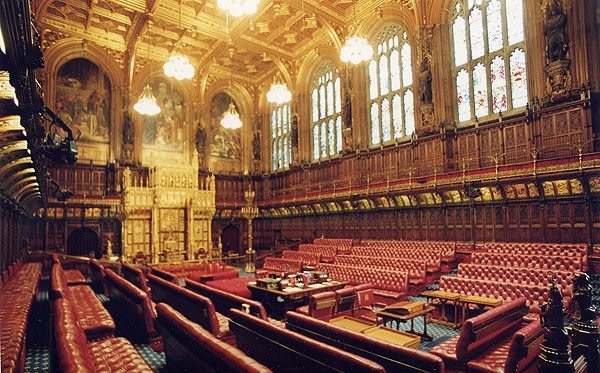Art and Culture
Want to Take Back Control? Then Abolish the Rule of Lords
The British people voted to reject an institution that curtails the will of people, that serves crony business interests before democracy, and that promotes nepotism.

“Take back control” was the main message of the Leave side throughout the referendum campaign. Britons recognised that the EU created a vast democratic deficit. Polling after the referendum showed that sovereignty was the primary motivation for Leave voters. They discovered the true extent of the power of Brussels bureaucrats — many of whom they had not even heard of, let alone elected — and it angered them.
But as we pass through political purgatory four months after the vote, the momentum created by that surge for control has waned. People were enthused by the opportunity to recover Westminster’s powers from Brussels; now it’s time to restore power to the masses.
British people did not vote to remove unelected Eurocrats only to keep their own versions at home. They voted to, as key liberal Brexiteer Daniel Hannan frequently stated, retain the right to “hire and fire our lawmakers”.
But the institutions that Brexiteers campaigned against are matched at home. Our main Brussels-replica is called the House of Lords. If we truly want to take back control, then we must continue scything the institutions that house unelected lawmakers.
Our current politicians won’t do it. Jean-Paul Sartre made the crucial distinction between the rebel, who fights for the sake of the fight, versus the revolutionary, who fights to seek change. Theresa May’s cabinet is filled with rebels. They may have made an impact on the British constitution, but they either had little intention of doing so (like the Remain-curious Boris Johnson), or they are unwilling to demand change at home now the referendum has passed.
Let’s consider the criticisms those rebels made of the EU. Brexiteers attacked the undemocratic nature of the EU. They noted that the only directly elected body, the European Parliament, has no power to propose legislation and that all EU laws ultimately come from the EU Commission, an unelected body. The House of Lords mimics these arrangements. Instead of being a necessary addition to our constitution, the Lords are an unaccountable obstruction of the will of the people. Brexiteers should object to the legitimacy of the House of Lords just as they objected to the EU Commission. It is indefensible that Lords are able to control legislation “assuming and asserting indefeasible, irrevocable rights and authority, wholly independent of the Nation”, as Thomas Paine outlined in The Rights of Man.
And when unaccountable institutions are allowed to reign supreme, they tend to gradually increase their powers. European politicians were frequently criticised for subtly expanding their scope. The House of Lords should expect the same criticism. The House had 666 Peers in 1999. We now have almost 850, and the majority of them are ex-MPs who are being given a retirement job. New boundary changes for the Commons mean that the upper-house will continue to dwarf it. With the Prime Minister able to appoint as many peerages as she wants, and other political leaders able to offer suggestions, peerages are used for political favours. The recent entry of Shami Chakrabarti clearly reveals this. The upper-house is becoming nothing more than a storeroom of past political deals. It is a sham.
The objections to the Lords and the EU extend beyond the charge of being undemocratic and nepotistic. Brexiteers also wanted to take back control of the large sums of money being sent to the EU, and the House of Lords copies the same cash guzzling behaviour.
Brexiteers set out to expose the lavish lives of EU politicians. Martin Durkin’s Brexit: The Movie made reference to what he called “the Brussel’s gravy train”, where Eurocrats were able to make use of generous expenses to fund luxury. We heard stories of Michelin star meals, armies of taxpayer-funded limos, and frequent retreats to spas and salons. 10,000 Brussels politicians earn more than our Prime Minister, and ministerial expenses cover private healthcare and education costs. But Lords are guilty of the same pampering. Last year, 124 of the 161 Lords based in London claimed up to £300 a day for simply walking to work. Through this method, Peer Baroness Wilcox pocketed £74,400 in parliamentary expenses over just two years. Research from the Electoral Reform Society shows that the average Peer costs the taxpayer £118,000 a year.
Furthermore, leading Brexiteers pointed out how EU officials used cash to curry favour with British institutions. They noted that several NGOs, charities, and broadcasters were given taxpayers’ cash in order to create a chorus of Europhilia. It led Daniel Hannan to describe the EU as a racket. Brexiteers were right to criticise the EU’s racketeering, but they should extend their criticism to the Lords. There are numerous instances of lobbied Lords exchanging political power for cash. One of the most notorious cases involved Labour peer Thomas Taylor boasting to journalists that companies had paid him $140,000 for his political assistance. Lords are meant to scrutinise legislature for the benefit of the people. But once they are adorned in their crimson silk velvet robes, their scrutiny wavers on behalf of business interests.
The British people voted to reject an institution that curtails the will of people, that serves crony business interests before democracy, and that promotes nepotism. Post-Brexit Britain must commit to weakening the influence of these forces on our new society. Abolishing the House of Lords would be a great start.





